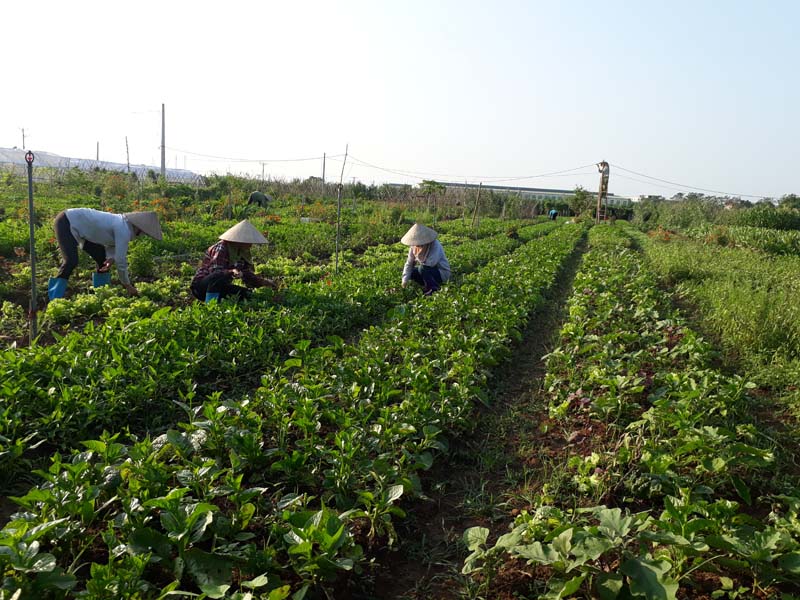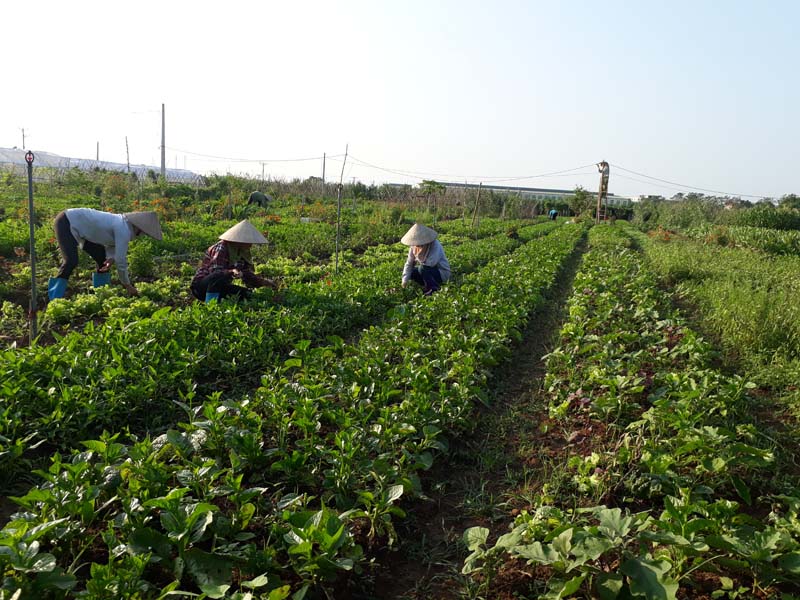
(HBO) – As an agriculture-based hamlet, Dong Suong in Thanh Lap commune (Luong Son district) has transferred 20.6 hectares of land, including over 20 hectares of agricultural land, to build factories to catch up with the industrialisation process.
Without plenty of land and labour,
farmers in Dong Suong have actively studied the market and applied modern
science-technology into production.
Farmers in Dong Suong hamlet, Thanh Lap commune
(Luong Son) harvest organic vegetables for sales in the market.
In 2009, the Agricultural Development Denmark
Asia (ADDA) provided agricultural training support for farmers in the commune.
The association of farmers in Thanh Lap established a group of organic
vegetable production with eight members on a model area of 3,511 square meters.
Recognising the sustainable efficiency and
environmental protection of organic vegetable production, the People’s
Committee of Thanh Lap commune has assigned the association of farmers to
coordinate to provide vocational training for youngsters and encourage them to
set up groups.
By 2016, the commune established five groups in
Dong Suong and Song hamlets with 33 members, growing organic vegetables on 2.85
hectares.
Since 2012, these groups have been operating
effectively, bringing high incomes for farmers.
To utilise land for production development, the
association of farmers encouraged households in Dong Suong to take part in
building models for land management, especially in land consolidation.
Taking Dong Suong organic
agriculture cooperative as the core, Dong Suong has formed large fields and
seasonal production. The movement of encouraging farmers to do business and
develop production has been promoted.
Economic development models have become more diverse, including cultivation,
livestock and agricultural services. In order to have capital for production,
members from the association of farmers have joined the group of loans.
They are entrusted to borrow loans from the Quan Trang branch of the Bank for
Agriculture and Rural Development. To date, the debt of farmers in Dong Suong
hamlet was estimated at 1.5 billion VND.
Annually, 85 percent of household members
register for effective production and business. 55 percent of good production
and business households have been recognised. More and more farmers have income
of 100 million VND – 1 billion VND per year./.
According to data from the Hoa Binh Provincial Party Committee, the industrial production index for the first six months of 2025 is estimated to have increased by 20% compared to the same period last year. This marks the highest year-on-year growth rate for this period since 2020.
In the first six months of 2025, Hoa Binh province’s export turnover was estimated at 1.145 billion USD, marking an 18.11% increase compared to the same period in 2024. Import turnover was estimated at $ 804 million, a 17.15% increase, which helped the province maintain a positive trade balance.
The lives of the ethnic minority farmers in Tan Lac district have gradually improved thanks to the new directions in agricultural production. This is a testament to the collective strength fostered through the professional associations and groups implemented by various levels of the district’s Farmers’ Union.
With the motto the "product quality comes first,” after nearly one year of establishment and operation, Muong village’s Clean Food Agricultural and Commercial Cooperative, located in Cau Hamlet, Hung Son Commune (Kim Boi district), has launched reputable, high-quality agricultural products to the market that are well-received by consumers. The products such as Muong village’s pork sausage, salt-cured chicken, and salt-cured pork hocks have gradually carved out a place in the market and they are on the path to obtaining the OCOP certification.
In the past, the phrase "bumper harvest, rock-bottom prices" was a familiar refrain for Vietnamese farmers engaged in fragmented, small-scale agriculture. But today, a new spirit is emerging across rural areas of Hoa Binh province - one of collaboration, organisation, and collective economic models that provide a stable foundation for production.
Maintaining growing area codes and packing facility codes in accordance with regulations is a mandatory requirement for agricultural products to be eligible for export. Recently, the Department of Agriculture and Environment of Hoa Binh province has intensified technical supervision of designated farming areas and packing facilities to safeguard the "green passport" that enables its products to access international markets.



